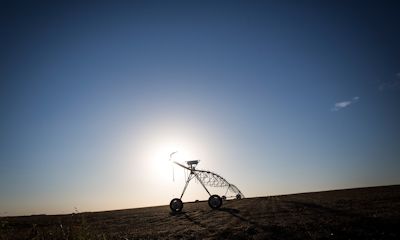February 4, 2016

In the world of Western water, a massive flood event or devastating drought is sure to get policy makers focused on the need to update and create more effective water management policy. The recent drought has ramped up much-needed Congressional interest to craft legislation that will allow Westerners to better manage and prepare for future dry times.

Federal moves may benefit local efforts to keep water available for Western agriculture. (Photo: Andrew Burton/Getty Images)
In the past six months alone, the House of Representatives has passed a Western drought bill, California and New Mexico drought bills have been introduced in the Senate, and Senate leaders are assessing which components of these could be wrapped into West-wide Senate drought legislation. Another bill has been introduced to advance an integrated watershed management program in Washington’s Yakima Basin.
U.S. Rep. Greg Walden introduced draft legislation in the House of Representatives that is intended to authorize settlement agreements developed for the Klamath River watershed, located in California and Oregon. This legislation is intended to compliment a bill already introduced by Oregon Senators Ron Wyden and Jeff Merkley. The Klamath settlement agreements are a prime example of how western interests can take care of their business if Congress helps.
Without these agreements successfully making it through Congress, Klamath Basin irrigators face no protection from enforcement of significant tribal water rights, no viable plan for dealing with the Endangered Species issues, and no identifiable path for working toward affordable energy costs that are comparable to other Western agricultural regions. The Klamath irrigation community wants to move on from the years of conflict and uncertainty to a future of increased predictability and stability. These and other affected communities have spent thousands of hours over the last decade at the negotiating table to reach this outcome.
Family farmer involvement
The Klamath settlement agreements are a critical means of keeping Basin family farmers and ranchers in the business of producing food and fiber for our country and the world. The settlement agreements are a unique solution that advances this critical need. What happens or does not happen for Klamath Basin irrigators could set a precedent example, not only for all Western family farms and ranches, but other areas of the country where agricultural production is beset with environmental challenges.
Ratifying these agreements in Congress is a good thing because they are good for irrigated agriculture. Proponents of these agreements believe they provide the most cost-effective, timely and politically viable solution.
The Family Farm Alliance is proud to join other organizations like the county Cattlemen’s Associations and the Oregon Cattlemen’s Associations, county Farm Bureaus and the Oregon Farm Bureau, as well as over a dozen irrigation districts, serving over 170,000 acres, who took similar care in making their informed decisions to support legislation that advances the Klamath Settlement Agreements.
Action taken on the Klamath legislation and other Western drought bills this year will send a strong signal on whether or not Congress really wants Western water users to have every tool available to survive and recover from the current drought and to prepare for the hard, dry years that the future may hold.
- Keppen is executive director, Family Farm Alliance
You May Also Like




